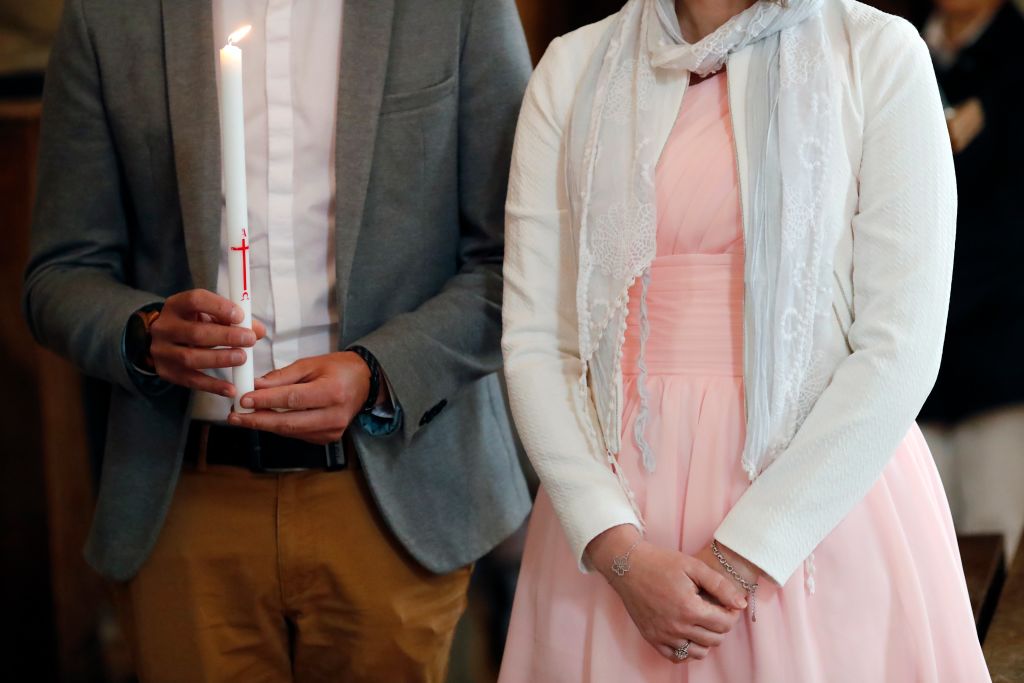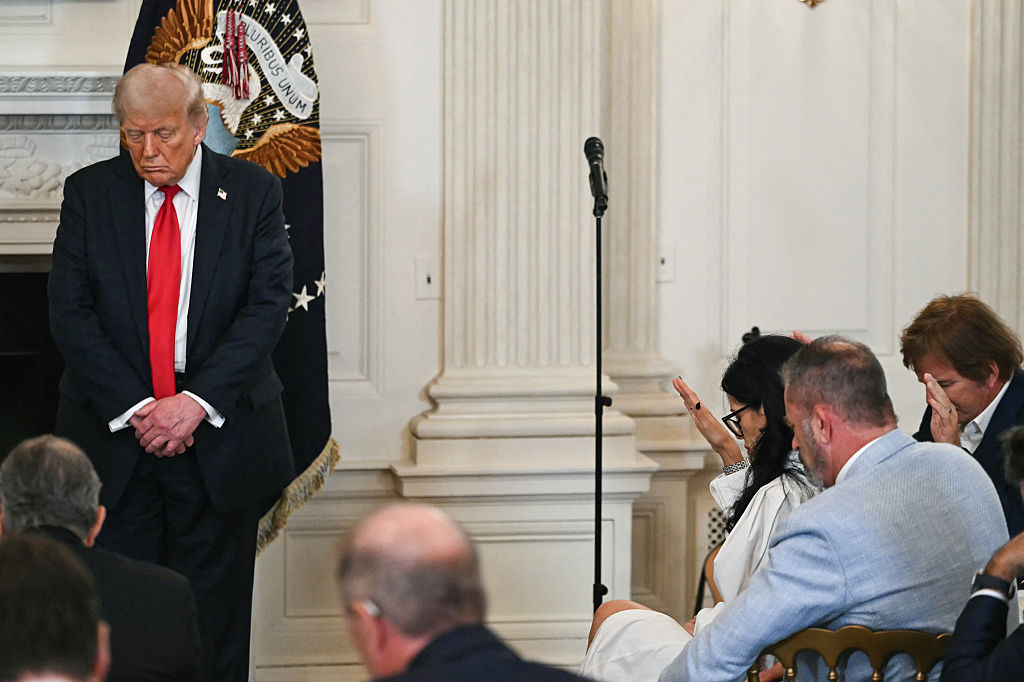Peep the new byline! I got married on Saturday and have decided to take my husband’s last name, which is nice because hopefully now there will be no confusion about how to pronounce Athey (for those who always wondered, it has a long “a” sound, but I wasn’t really in the business of correcting people).
My husband (still weird to write!) and I first met on a dating app about two and a half years ago. On our first date, when I found out that he was raised Southern Baptist, I warned that I only intended to get married in the Catholic Church. We got engaged last September, my husband converted to Catholicism at this year’s Easter Vigil, and we got married on October 7. It was a beautiful Nuptial Mass followed by pictures, a cocktail hour and a dinner reception with more drinks and dancing. We leave for our honeymoon to Morocco shortly and, most importantly, are excited to spend the rest of our lives together.
Interestingly, while I was doing some last-minute planning in the weeks leading up to the wedding, I noticed a pretty heated debate breaking out on Twitter about whether marriage is “worth it” to men. It’s not uncommon to see marriage devalued by left-wing commentators, particularly third-wave feminists who believe marriage is a tool of the patriarchy meant to subjugate women and keep them from reaching their full potential outside of the home. Weirdo leftists have also recently become obsessed with the idea of polycules or open marriages where there is no expectation of fidelity because they foolishly believe that sexual intimacy can or should be entirely separated from emotional intimacy.
However, the debate last week was started by members of the red pill movement and specifically an influencer named Pearl Davis, who argues that marriage is a bad “deal” for men. I’m always bothered by the use of terms like “deal” and “contract” and “business arrangement” to describe marriage. Governments have a good reason to incentivize stable and loving families, as they tend to rear happy and well-adjusted children and thus productive and successful adults. But if marriage is too oft recognized as merely a government contract that confers tax credits and other benefits, it over time becomes separated from its true meaning: a lifelong commitment to each other and a covenant with God. That’s part of the reason why modern attitudes toward marriage come from a merely rational or logical sense: how might a spouse benefit me? Does cohabitation or marriage make financial sense? Am I protected if my spouse breaks the marriage contract?
Of course, to Pearl’s credit, if a religious, idealistic view of marriage is not the norm, men have legitimate reasons to be skeptical of the institution. According to popular statistics, as many as half of all first marriages fail. Child custody battles are frequently skewed in the woman’s favor. The divorced man ends up bearing the brunt of child support payments and alimony while not being able to see his kids as often as he might like. Divorce courts tend to err on the side of protecting women because men used to be the sole earners, which would leave divorced women without the career or skills required to support themselves or their children. Now, most households are dual-income and more women work outside of the home than ever before.
Divorce, though, can be and usually is awful for all parties involved, not just the men. One of Pearl’s most vocal defenders is a former MLB pitcher who claims his wife was “incentivized” to divorce him and scoffs at his alimony payments, but previously admitted his drug and alcohol use, gambling addiction and other reckless behaviors endangered himself and his kids, costing him his marriage. I’m sure his ex-wife would find his recent online self-victimization quite interesting.
Another quibble I have with Pearl is that she estimates that up to 75 percent of marriages “fail” because many marriages that don’t end in divorce are just situations in which a man is “trapped” and not truly happy. For example, she claims that men whose wives get fat or ugly later in life cannot be considered to be in a successful marriage. The traditional female influencers who I follow absolutely encourage women to do their best to stay physically attractive to their husbands, but recognize that this isn’t always easy as people get older. As Brittany Hugoboom, a model and the founder of Evie magazine puts it, “I’m all for being as hot as possible in your marriage but at the end of the day, it’s such a blessing to have someone who loves you unconditionally.” Pearl’s content rejects unconditional love in favor of perfect reciprocity and thus presupposes that marriage is pretty much doomed to fail one way or another.
These complaints about marriage don’t like to acknowledge the amazing benefits of marriage for men. Married men are twice as happy as their unmarried counterparts, and married fathers are even happier. Married men also take fewer risks, eat better, are physically healthier, live longer, make more money and have more and better sex. When marriage skeptics do acknowledge these advantages, they claim that men who are selected for marriage already had these habits and traits, rather than the other way around. But multiple research studies have suggested that it is marriage itself that boosts and sustains happiness.
Daily Wire host Matt Walsh recently posted a podcast clip battling against many of Pearl’s arguments, in which he raises legitimate questions about the claim that half of marriages end in divorce. Walsh notes that US Census data puts the figure at closer to 35 percent, and adds even more convincingly, “it does not follow that your own particular marriage has a 35 or 50 percent chance of failure.” After all, one of the most reassuring things that my husband and I learned during our Catholic marriage prep courses was that couples who attend Church regularly, use natural family planning methods and pray together are statistically very unlikely to divorce. I’m only a few days into married life and am certainly no expert, but wouldn’t you feel more confident heading into a marriage knowing that God gave you a roadmap to follow so that you could enjoy true satisfaction and happiness with your partner?
There is another problem facing modern marriage, which is the fact that both men and women seem to have a hard time finding a spouse who shares these values. My best immediate advice is to be totally honest with yourself and potential relationship partners about what you want. Otherwise, regular readers of Culture Shock know that we are always talking about how to nurse American culture back to health. Unfortunately, that’s not a simple or short-term task.
All of that being said, I am obviously pro-marriage and am looking forward to enjoying the trip of a lifetime with my new husband. I will see you all in a couple of weeks.

























